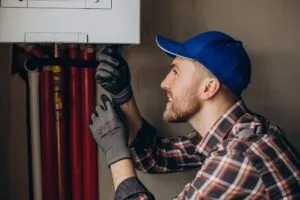Boilers vs. Furnaces: A Comprehensive Comparison For Kansas City Homeowners
When it comes to keeping your Kansas City home warm and cozy during the colder months, choosing the right heating system is crucial. Two popular home heating options are boilers and furnaces, each offering advantages and challenges. As a homeowner, understanding the key differences between these systems can help you make an informed decision tailored to your family’s comfort, budget, and specific needs.
In this article, we will provide a comprehensive comparison of these two widely used heating methods, examining factors such as efficiency, cost, maintenance, and overall performance.
Backed by the expertise of Climate Control Heating, Cooling & Plumbing this guide aims to equip you with the knowledge needed to make the best heating choice for your Kansas City home.
Understanding The Basic Functioning Of Boilers And Furnaces
Before diving into a detailed comparison, it’s essential to understand how each heating system operates.
- Boilers: Boilers use hot water or steam to distribute heat throughout your home. The boiler heats water, which is then circulated through pipes to radiators or baseboard heaters installed in each room. Alternatively, radiant floor heating systems can also be used with boilers, where the hot water circulates through tubes installed beneath the floors, providing comfortable warmth.
- Furnaces: Furnaces generate heat through the combustion of natural gas, propane, or oil. The heat produced is transferred to the air, which is then distributed throughout your home via a ductwork system and vents. Forced-air furnaces are the most common type, utilizing a blower fan to circulate the heated air.
Comparing Efficiency And Performance
Boilers and furnaces vary in terms of efficiency and overall performance, impacting energy consumption and your utility bills.
- Boilers: Boilers are generally more energy-efficient than furnaces, as they deliver heat through hot water or steam with minimal energy loss. According to the U.S. Department of Energy, boiler systems can achieve efficiency ratings of up to 98.5%. The use of radiant heat or zoned thermostats also enables better temperature control, preventing energy waste.
- Furnaces: Furnace efficiency ratings vary widely depending on the type and age of the unit. The Annual Fuel Utilization Efficiency (AFUE) measures furnace efficiency, with high-efficiency models typically falling within the range of 90-98.5% AFUE. It’s also worth noting that since furnaces distribute heat via air, heat loss can occur through the ductwork, reducing overall efficiency.
Maintenance And Reliability
Regular maintenance is crucial for both boilers and furnaces to ensure longevity and optimal performance.
- Boilers: Boilers generally require less maintenance than furnaces, as they have fewer moving parts. However, it’s essential to check for leaks, corrosion, and sediment buildup and maintain the water pressure at the manufacturer’s recommended levels. Professional maintenance services should be scheduled annually to ensure optimal performance.
- Furnaces: Furnaces require more frequent maintenance, including regular filter changes, blower motor lubrication, and inspection of the heat exchanger, burners, and ignition system. Like boilers, furnaces also benefit from annual professional maintenance services. If properly maintained, both boilers and furnaces can last up to 15-20 years.
Installation Costs And Financial Considerations
Understanding the installation costs and financial implications of both heating systems is critical in making a well-informed decision.
- Boilers: Boilers often have higher upfront installation costs due to the complexity of the piping and radiator installation. However, the higher initial investment is offset by lower operating costs and energy savings over time.
- Furnaces: Furnaces are generally more affordable to install and replace, making them a popular choice among budget-conscious homeowners. However, they may offer different long-term energy savings than boilers.
It’s essential to weigh the initial installation costs and potential energy savings to determine which heating system aligns best with your budget and long-term financial goals.
Indoor Air Quality And Noise Considerations
Both boilers and furnaces can impact the air quality and acoustics within your home.
- Boilers: Boilers don’t use air to distribute heat, reducing the circulation of allergens, dust, and other airborne particles often associated with ducted heating systems. Furthermore, since boilers don’t rely on blowers or vents, they operate more quietly compared to furnaces, providing a peaceful home environment.
- Furnaces: Furnaces can impact indoor air quality, as they rely on ductwork to distribute heated air throughout the home, which can carry allergens, dust, and other irritants. Additionally, furnaces are usually noisier due to the blower fan’s operation, although modern high-efficiency models tend to produce less noise.
Environmental Impact And Fuel Options
Considering the environmental impact and available fuel options for each heating system can help you make an eco-conscious decision.
- Boilers: Boilers are available in various fuel types, including natural gas, propane, oil, and electricity. Some boilers can even be adapted to use renewable energy sources like solar panels, further reducing your home’s carbon footprint.
- Furnaces: Furnaces primarily run on natural gas, propane, or oil. While natural gas and propane are relatively clean-burning fuels, oil furnaces produce higher emissions. Electric furnaces are also available, though they may be less cost-effective in regions with high electricity rates.
Climate Control Heating, Cooling & Plumbing: Your Trusted Partner For Home Heating Solutions
The choice between boilers and furnaces ultimately depends on your priorities, budget, and desired comfort level. Each system has its unique benefits, making it essential to carefully evaluate your Kansas City home’s specific needs when selecting the best heating option. As you navigate this important decision, having the support of a dependable heating, cooling, and plumbing expert can make all the difference.
Climate Control Heating, Cooling & Plumbing offers comprehensive services to help you choose, install, and maintain the ideal heating system for your home. Our experienced technicians are dedicated to delivering exceptional service and customized solutions that cater to your unique requirements.
Contact Climate Control Heating, Cooling & Plumbing today for a personalized consultation on boiler or furnace installation in Kansas City, MO, and experience the warmth, comfort, and energy savings that come with a professionally installed and maintained home heating system.





